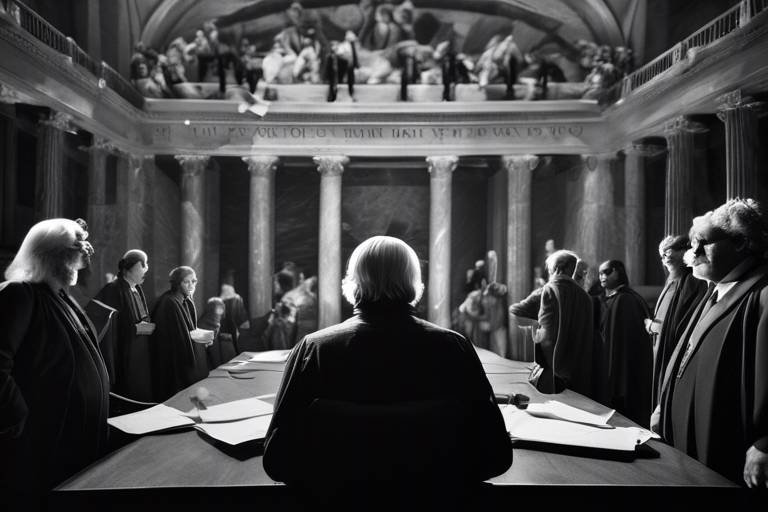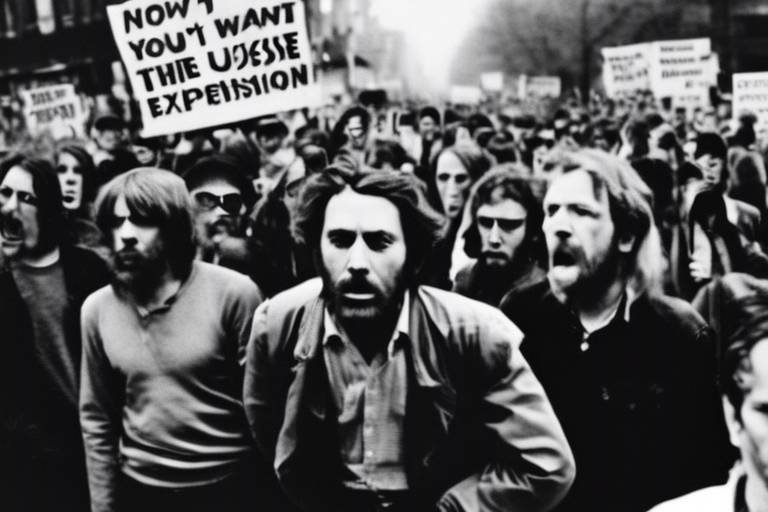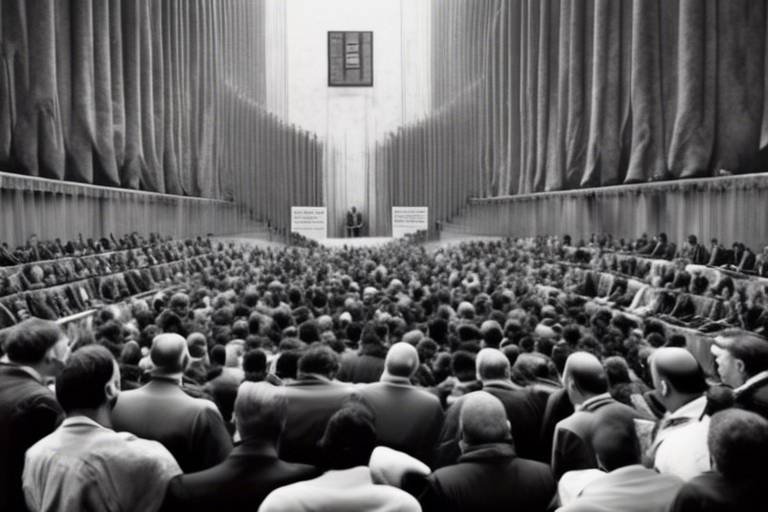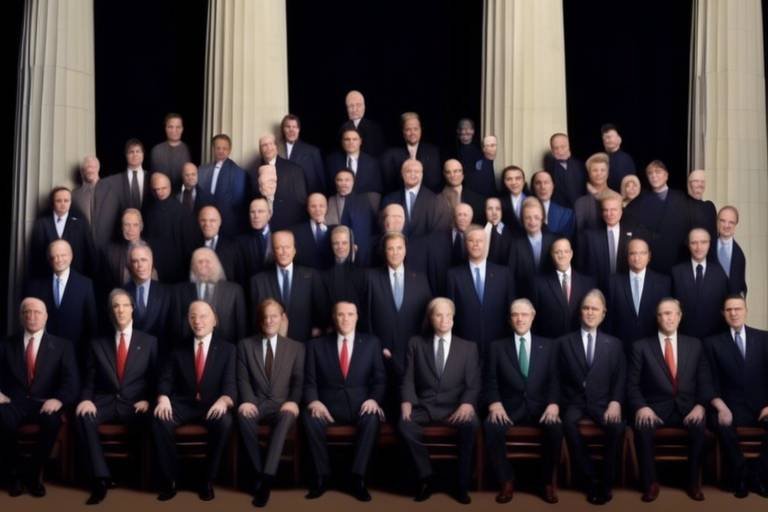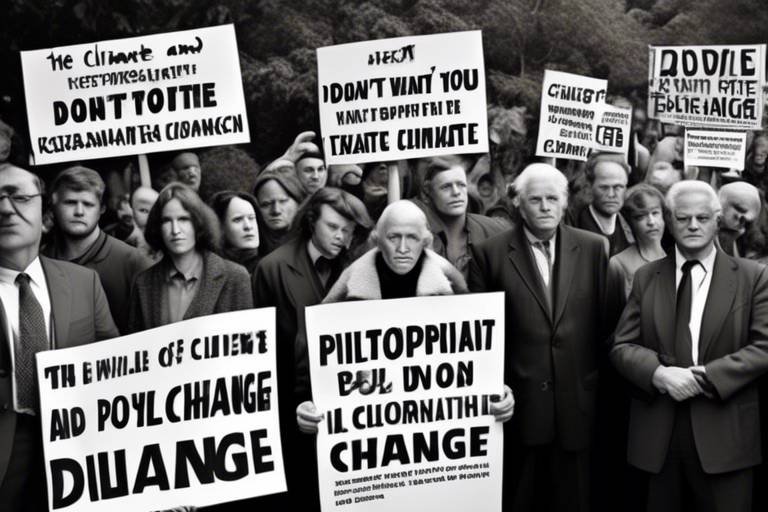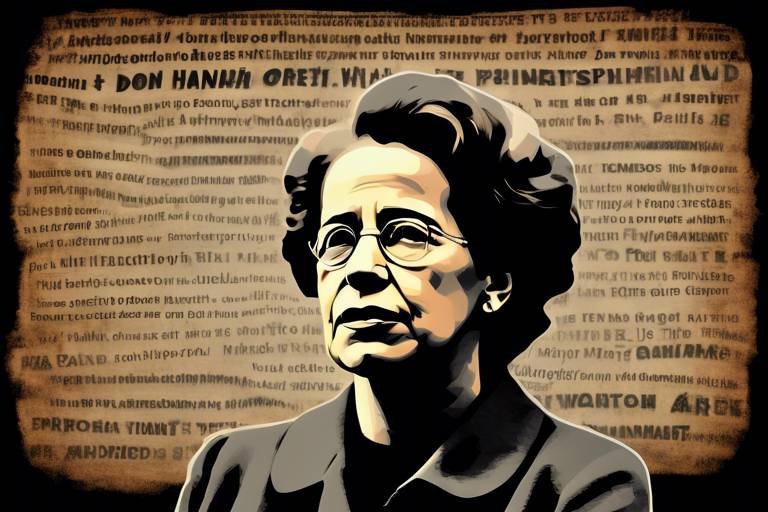The Role of Philosophy in Constructing Political Narratives
Philosophy is not just an abstract discipline confined to dusty books and lecture halls; it plays a crucial role in shaping the political narratives that govern our societies. Political narratives are the stories we tell ourselves about how we should be governed, what justice means, and what our rights are. These narratives are deeply intertwined with philosophical ideas, which provide the frameworks through which we interpret our political realities. Imagine trying to build a house without a blueprint; similarly, political narratives lack coherence without the guiding principles of philosophy.
At the heart of every political ideology lies a philosophical underpinning that influences how we perceive authority, governance, and societal values. For instance, the concept of justice is not merely a legal term; it is a philosophical idea that has evolved over centuries, shaping how laws are created and enforced. Likewise, ideas about freedom and power are not just political slogans; they are rooted in philosophical discussions that date back to ancient thinkers like Plato and Aristotle. These philosophical discussions help us frame our political landscapes, guiding everything from grassroots movements to international relations.
In contemporary politics, we often witness the clash of narratives that can be traced back to differing philosophical beliefs. For example, the debate over healthcare can be viewed through the lens of distributive justice, where one side argues for universal access as a moral imperative, while the other emphasizes individual responsibility and market solutions. This tug-of-war is not merely about policy; it reflects deeper philosophical convictions about what constitutes a fair society. Thus, understanding these philosophical foundations is essential for anyone looking to grasp the complexities of modern political discourse.
Moreover, the influence of philosophy extends beyond theoretical discussions; it actively shapes policy-making and governance. Political leaders often invoke philosophical principles to justify their actions or policies. For instance, a government may argue that its surveillance practices are justified in the name of national security, appealing to a philosophical understanding of the social contract. Conversely, activists may challenge such practices by invoking principles of individual freedom and privacy rights, demonstrating how philosophical ideas can lead to real-world consequences.
Ultimately, the intersection of philosophy and politics is a dynamic and evolving relationship. As societal values shift and new challenges arise, the philosophical frameworks that inform our political narratives must also adapt. This ongoing dialogue between philosophy and politics is what keeps our democratic processes vibrant and responsive. It invites us to question, to debate, and to redefine what it means to live in a just and free society. Therefore, the role of philosophy in constructing political narratives is not just significant; it is essential for fostering a healthy, engaged citizenry.
- How does philosophy influence political ideologies?
Philosophy provides the foundational principles that shape ideologies such as liberalism, conservatism, and socialism. Each ideology interprets concepts like justice, freedom, and power differently, impacting political narratives and policies. - Can political narratives change over time?
Yes, political narratives can evolve as societal values shift, new philosophical ideas emerge, and historical events unfold. This adaptability is crucial for maintaining relevance in a changing world. - Why is justice a central theme in political philosophy?
Justice addresses the fair distribution of resources, opportunities, and rights within society. It is a pivotal concept that informs laws, policies, and public discourse, making it essential for political narratives.

The Historical Context of Political Philosophy
Understanding the evolution of political philosophy is crucial for grasping how historical events and social movements have shaped contemporary political narratives. Political philosophy has not emerged in a vacuum; rather, it has been influenced by the tumultuous events of history, from wars and revolutions to social upheavals and technological advancements. Each era has produced thinkers who have grappled with the pressing issues of their time, leading to the development of ideas that continue to resonate today.
For instance, the Ancient Greeks laid the groundwork for political thought with philosophers like Plato and Aristotle. Plato’s vision of an ideal state, governed by philosopher-kings, reflects his belief in the pursuit of justice and the role of wisdom in governance. Meanwhile, Aristotle’s practical approach emphasized empirical observation and the importance of the middle class in achieving a stable government. These early ideas set the stage for future political discourse, illustrating how philosophical frameworks can influence the structures of power.
As we move through history, the Middle Ages brought about a shift with the rise of Christian philosophy. Thinkers like St. Augustine and St. Thomas Aquinas merged religious beliefs with political theory, arguing that moral law should guide governance. Their contributions highlight how faith can intertwine with political narratives, shaping societal values and norms.
The Renaissance and the Enlightenment periods further revolutionized political thought. Figures such as John Locke and Jean-Jacques Rousseau championed the ideas of individual rights and social contracts. Locke’s assertion that government should be based on the consent of the governed laid the groundwork for modern democracy, while Rousseau’s concept of the general will emphasized the collective identity of the populace. These philosophies not only influenced political structures but also inspired revolutions, such as the American and French Revolutions, which sought to implement these ideals.
In the 19th century, the rise of industrialization and the subsequent social changes prompted new philosophical movements. Marxism, articulated by Karl Marx and Friedrich Engels, critiqued capitalism and proposed a revolutionary approach to achieving social equality. Their ideas have had a profound impact on political narratives, particularly in shaping socialist and communist movements across the globe.
In contemporary times, political philosophy continues to evolve, responding to the challenges of globalization, technological advancements, and climate change. Thinkers like John Rawls have reinvigorated discussions around justice and fairness in society, emphasizing the need for a just distribution of resources. The interplay between historical context and philosophical thought remains vital in understanding how political narratives are constructed and the ideologies that emerge from them.
In summary, the historical context of political philosophy reveals a rich tapestry of ideas and movements that inform our current political landscape. By examining the evolution of these thoughts, we can better appreciate the complexities of governance and the narratives that shape our societies today.
- What is political philosophy? - Political philosophy is the study of fundamental questions about the state, government, justice, rights, and the role of individuals within society.
- How has political philosophy evolved over time? - Political philosophy has evolved through various historical contexts, influenced by key thinkers and social movements, adapting to the changing needs and values of society.
- Why is understanding political philosophy important? - Understanding political philosophy helps individuals critically engage with political narratives and ideologies, fostering informed citizenship and participation in democratic processes.

Key Philosophical Concepts in Politics
When we dive into the realm of politics, we quickly realize that it's not just about policies and governance; it's also deeply intertwined with philosophical concepts that shape our understanding of authority, rights, and justice. These concepts serve as the backbone of political narratives, influencing how societies define their values and structures. Let's explore some of the essential philosophical ideas that play a pivotal role in constructing political narratives.
One of the most fundamental concepts is justice. Justice isn't merely a legal term; it's a philosophical ideal that informs how we perceive fairness and equity within society. Different theories of justice—such as distributive justice, which concerns the fair allocation of resources, and retributive justice, which deals with punishment and accountability—impact political discourse significantly. For instance, when discussing social welfare programs, the question often arises: "What is a fair distribution of resources?" This inquiry is steeped in the philosophical underpinnings of distributive justice.
Another critical concept is freedom. This idea is often romanticized in political narratives, yet its interpretation can vary widely. For some, freedom means the absence of interference from the government, while for others, it encompasses the idea of social and economic opportunities that enable individuals to thrive. The tension between these interpretations often fuels political debates. Are we truly free if systemic inequalities prevent certain groups from accessing the same opportunities? This question highlights the complex relationship between freedom and justice.
Moreover, the concept of power is essential in political philosophy. Power dynamics shape political narratives, often determining who has a voice and who remains marginalized. Theories of power explore how authority is exercised and challenged within societies. For instance, the philosopher Michel Foucault argued that power is not just held by governments but is diffused throughout society in various forms, influencing everything from social norms to institutional practices. This perspective invites us to reconsider traditional narratives that focus solely on governmental power.
To illustrate these concepts further, consider the following table that summarizes the key philosophical ideas and their implications for political narratives:
| Philosophical Concept | Definition | Political Implications |
|---|---|---|
| Justice | Fairness in the distribution of resources and opportunities | Influences social welfare policies and perceptions of equity |
| Freedom | The state of being free; absence of constraints | Shapes debates on individual rights versus collective responsibilities |
| Power | The ability to influence or control behavior and outcomes | Determines who has a voice in political discourse and governance |
These key concepts—justice, freedom, and power—are not just abstract ideas; they are the very fabric of political narratives that shape our societies. Understanding them allows us to engage critically with the political landscape and recognize the philosophical roots of the ideologies that influence our lives.
- What is the significance of philosophy in politics? Philosophy provides the foundational concepts that shape our understanding of governance, authority, and societal values.
- How does the concept of justice influence political narratives? Justice informs discussions about fairness and equity, impacting policies related to social welfare and resource distribution.
- Why is freedom a complex concept in political philosophy? Freedom can be interpreted in various ways, leading to debates about individual rights versus social responsibilities.
- How does power dynamics affect political discourse? Power dynamics determine who has a voice and influence in society, often marginalizing certain groups in political discussions.

Justice and Political Narratives
Justice is not just a word; it’s a powerful concept that resonates deeply within the fabric of society. When we talk about political narratives, justice stands as a cornerstone, influencing how we perceive right and wrong, fair and unfair. The way narratives about justice are constructed can significantly shape public opinion and policy. For instance, consider how different societies interpret the notion of justice. In some cultures, justice may be viewed through the lens of retribution, while in others, it might be seen as a path towards restoration or rehabilitation. This dichotomy not only affects legal frameworks but also influences the broader political discourse.
One of the most compelling aspects of justice in political narratives is its ability to mobilize people. Think about it: when a community feels unjustly treated, it can rally around a cause, demanding change. This mobilization often leads to significant political movements, as seen in various civil rights movements around the world. The narratives constructed around justice can ignite passion and drive individuals to advocate for their rights or the rights of others. This is where the philosophical theories of justice come into play, each offering a different lens through which to view societal issues.
To illustrate how justice intertwines with political narratives, let’s explore a few key theories:
- Distributive Justice: This theory emphasizes the fair allocation of resources and opportunities. It raises questions like, "Who gets what?" and "How do we ensure equality?" In political narratives, discussions surrounding welfare programs or taxation often hinge on principles of distributive justice.
- Retributive Justice: This concept focuses on punishment and accountability. Political narratives that address crime and punishment often draw from retributive justice, leading to debates about law enforcement practices and criminal justice reform.
- Restorative Justice: Unlike the previous two, restorative justice seeks to repair harm by focusing on the needs of victims and offenders. This approach can reshape political narratives around crime, emphasizing healing over punishment.
Each of these theories provides a different perspective, shaping how political narratives are constructed and understood. For example, a narrative that emphasizes distributive justice might advocate for policies aimed at reducing income inequality, while one focused on retributive justice might support harsher penalties for crime. The implications of these narratives can be profound, affecting everything from public policy to individual lives.
Furthermore, the media plays a crucial role in shaping these narratives. News outlets often frame stories around specific concepts of justice, influencing public perception and political action. A story about a controversial court case, for example, can evoke strong emotions and lead to widespread calls for change, depending on how justice is portrayed.
In conclusion, justice is more than a philosophical concept; it is a driving force behind political narratives that shape our world. By understanding the various theories and their implications, we can better comprehend how justice influences governance and societal values. As we navigate the complex landscape of politics, it’s essential to recognize the power of justice in crafting narratives that resonate with the public and inspire change.
- What is the role of justice in political narratives? Justice serves as a foundational concept that influences how societies perceive fairness, equality, and accountability, shaping political discourse and policy-making.
- How do different theories of justice affect political narratives? Different theories, such as distributive, retributive, and restorative justice, provide varied perspectives that can lead to distinct political narratives about issues like crime, equality, and social welfare.
- Why is media important in shaping narratives about justice? Media plays a critical role in framing stories around justice, influencing public perception and political action by highlighting specific aspects of justice in various contexts.

Distributive Justice
Distributive justice is a concept that focuses on the fair allocation of resources, opportunities, and wealth within a society. At its core, it raises fundamental questions about what is considered "fair" and "just" in terms of distribution. Imagine a pie that needs to be shared among friends; how do you decide who gets what slice? This analogy captures the essence of distributive justice, as it grapples with the complexities of equity and equality. Various theories have emerged to address these questions, each offering different perspectives on how resources should be distributed.
One prominent view is that of egalitarianism, which advocates for equal distribution of resources among all individuals. Proponents of this theory argue that everyone should have access to the same opportunities, regardless of their background or circumstances. In contrast, utilitarianism suggests that resources should be allocated in a way that maximizes overall happiness or utility. Here, the focus is less on equality and more on the outcomes of distribution. This leads to a fascinating debate: should society prioritize equal shares or the greatest good for the greatest number?
Furthermore, distributive justice is not merely an abstract philosophical concept; it has tangible implications for political narratives and policy-making. For instance, consider the following key aspects:
- Social Welfare Programs: Policies aimed at redistributing wealth, such as taxation and social safety nets, are often justified through the lens of distributive justice.
- Affirmative Action: Programs designed to promote equal opportunities for historically marginalized groups can be viewed as efforts to rectify past injustices.
- Universal Basic Income: This modern proposal seeks to provide a basic financial safety net for all citizens, raising questions about fairness and societal responsibility.
Each of these aspects reflects how the principles of distributive justice can influence political discourse. For example, debates surrounding taxation often hinge on the question of whether the wealthy should contribute a larger share of their income to support social programs. Critics may argue that such measures disincentivize hard work, while supporters contend that they are essential for reducing inequality.
Ultimately, the discourse around distributive justice is rich and complex, intertwining with various political ideologies and societal values. It challenges us to reflect on our own beliefs about fairness and responsibility. As we navigate these discussions, it's crucial to recognize that the way we approach distributive justice can significantly impact the fabric of our society, shaping not only policies but also the very narratives that define our collective identity.
- What is distributive justice? It refers to the ethical principles guiding the allocation of resources and opportunities within a society.
- Why is distributive justice important? It helps to address issues of inequality and ensures that all individuals have fair access to resources.
- How does distributive justice influence political policies? It shapes discussions around taxation, social welfare programs, and affirmative action, impacting legislation and governance.

Retributive Justice
Retributive justice is a fascinating concept that delves into the very heart of how societies perceive punishment and accountability. At its core, retributive justice is about ensuring that individuals who commit wrongdoings face consequences that are proportionate to their actions. This principle is often encapsulated in the idea of "an eye for an eye," suggesting that the punishment should reflect the severity of the crime. But how does this principle play out in the real world, and what implications does it have for our political narratives?
In many political discourses, the notion of retributive justice often arises in discussions surrounding law enforcement and criminal justice reform. For instance, when a high-profile crime occurs, public outcry often demands swift and severe punishment for the perpetrators. This reaction can be seen as a manifestation of retributive justice, where the focus is on ensuring that justice is served in a way that reflects the gravity of the offense. However, the challenge lies in balancing the need for accountability with the principles of fairness and rehabilitation.
One of the critical debates within retributive justice is its effectiveness in deterring crime. Proponents argue that knowing there are significant consequences for wrongdoing can dissuade potential offenders. On the other hand, critics question whether harsh punishments actually reduce crime rates or simply perpetuate cycles of violence and recidivism. This ongoing discourse highlights the complex interplay between retributive justice and societal values, forcing us to examine what we truly believe justice should look like.
Moreover, the application of retributive justice varies significantly across different political ideologies. For example, in more conservative political frameworks, there may be a stronger emphasis on punitive measures and a belief that strict enforcement of laws serves the greater good. In contrast, more progressive political narratives might advocate for restorative justice approaches that focus on healing and reintegrating offenders into society rather than merely punishing them.
To illustrate the differences in how retributive justice is perceived across various political contexts, consider the following table:
| Political Ideology | View on Retributive Justice |
|---|---|
| Conservatism | Emphasizes strict punishment as a deterrent and a means of upholding social order. |
| Liberalism | Advocates for a balanced approach, recognizing the need for punishment but also for rehabilitation. |
| Socialism | Focuses on addressing the root causes of crime, often criticizing punitive measures as ineffective. |
Ultimately, retributive justice serves as a lens through which we can examine our societal values and the narratives we construct around crime and punishment. It forces us to confront uncomfortable questions: What is the purpose of punishment? Is it merely to exact revenge, or should it also aim to rehabilitate and reintegrate? How do our political ideologies shape our understanding of justice? These questions are not just academic; they resonate deeply within our communities and influence the policies we advocate for.
As we navigate the complexities of retributive justice, it's essential to remain open to dialogue and to consider the broader implications of our beliefs about punishment and accountability. After all, the narratives we create around justice not only reflect our values but also shape the future of our society.
- What is retributive justice? Retributive justice is a theory of justice that emphasizes punishment as a response to wrongdoing, aiming to ensure that offenders face consequences proportional to their actions.
- How does retributive justice differ from restorative justice? While retributive justice focuses on punishment, restorative justice seeks to repair the harm caused by criminal behavior through reconciliation and rehabilitation.
- Can retributive justice be effective in reducing crime? The effectiveness of retributive justice in deterring crime is debated, with some arguing that severe punishments deter crime, while others believe they can lead to cycles of violence.
- How do political ideologies influence views on retributive justice? Different political ideologies shape perspectives on retributive justice, with conservatives often advocating for strict punishments and progressives emphasizing rehabilitation and addressing root causes of crime.

Freedom as a Political Ideal
Freedom is often hailed as the cornerstone of political philosophy, a concept so vital that it shapes the very fabric of our societies. But what does freedom truly mean in a political context? Is it merely the absence of constraints, or does it encompass a broader spectrum of rights and responsibilities? The interpretation of freedom varies widely, influenced by cultural, historical, and philosophical factors. In essence, freedom can be viewed through two primary lenses: negative freedom and positive freedom.
Negative freedom refers to the absence of interference from others, particularly the government. Imagine a vast expanse of land where you can roam freely without barriers. This concept is championed by thinkers like John Stuart Mill, who argued that individual liberty should be protected from external constraints. In political narratives, negative freedom often manifests in discussions about civil liberties, such as the right to free speech, the right to assemble, and the right to privacy. These rights are foundational to democratic societies, allowing individuals to express themselves and pursue their own paths.
On the other hand, positive freedom emphasizes the idea of being empowered to achieve one's potential. This perspective argues that true freedom is not just about the absence of constraints but also about having the resources and opportunities to make meaningful choices. Think of it as not just being free to walk in a park but also having access to education, healthcare, and economic stability that allow you to thrive. Philosophers like Isaiah Berlin have highlighted this distinction, arguing that a society should not only protect individuals from oppression but also ensure that they have the means to exercise their freedoms effectively.
The implications of these differing interpretations of freedom are profound. For instance, political ideologies rooted in negative freedom might advocate for minimal government intervention, promoting a laissez-faire approach to economics. In contrast, those who emphasize positive freedom might support policies aimed at reducing inequality and providing social services. This divergence often leads to heated debates about the role of government in our lives, with questions such as:
- Should the government intervene to ensure that all citizens have access to basic needs?
- How do we balance individual rights with the common good?
- What role does education play in achieving true freedom?
Moreover, the concept of freedom is not static; it evolves as societies change. Historical events, such as the civil rights movement or the fight for LGBTQ+ rights, have reshaped our understanding of what it means to be free. These movements have challenged existing narratives and pushed for a more inclusive definition of freedom that recognizes the rights of marginalized groups. In this light, freedom becomes a dynamic ideal, one that must be continually re-evaluated to ensure it reflects the values of a just society.
In conclusion, freedom as a political ideal is a complex tapestry woven from various threads of thought. It challenges us to consider not only how we define freedom but also how we can create a society that fosters both negative and positive freedoms. As we navigate the intricate landscape of political narratives, it is essential to engage with these concepts critically, ensuring that our understanding of freedom is as expansive as the ideals we aspire to achieve.
- What is the difference between negative and positive freedom?
Negative freedom focuses on the absence of interference, while positive freedom emphasizes the empowerment to achieve one's potential. - How do historical events influence our understanding of freedom?
Historical movements and societal changes challenge existing narratives and expand our definitions of freedom. - Why is freedom important in political philosophy?
Freedom is foundational to democracy and individual rights, shaping how societies govern and interact.

Philosophy's Influence on Political Ideologies
Political ideologies are not just random collections of beliefs; they are deeply rooted in philosophical thought that shapes how societies view governance, authority, and individual rights. At the heart of these ideologies lies a complex interplay between philosophical frameworks and the narratives that emerge from them. Whether it’s the quest for liberty, the pursuit of equality, or the structure of authority, philosophy provides the groundwork that informs these political narratives. So, how do these philosophical underpinnings manifest in our political landscape?
One of the most significant influences comes from the Enlightenment period, where thinkers like John Locke and Jean-Jacques Rousseau laid the groundwork for modern liberalism. Their ideas about individual rights, social contracts, and the role of government resonate through contemporary political discourse. For instance, when we talk about human rights today, we are echoing the sentiments of these Enlightenment philosophers who argued that individuals have inherent rights that must be protected by the state. This has led to a political narrative that prioritizes personal freedoms and democratic governance.
On the other hand, we have socialism, which draws heavily from the critiques of capitalism presented by philosophers such as Karl Marx. Marx's analysis of class struggles and economic inequality has profoundly influenced socialist ideologies, which advocate for collective ownership and social welfare. This philosophical perspective shapes political narratives around economic justice, often highlighting the disparities between the wealthy and the poor. It raises questions like: “How can we create a fairer society?” and “What role should the government play in redistributing wealth?” These inquiries lead to political debates about taxation, social programs, and the responsibilities of the state versus the individual.
Moreover, conservatism, with its emphasis on tradition and stability, also finds its roots in philosophical thought. Thinkers like Edmund Burke have argued for the importance of maintaining societal norms and values. This perspective influences political narratives that resist rapid change and advocate for gradual reform, often framing these discussions around the idea of preserving cultural heritage and societal cohesion. In this way, conservatism presents a counter-narrative to both liberal and socialist ideologies, emphasizing the need for continuity and respect for established institutions.
In summary, the influence of philosophy on political ideologies is profound and multifaceted. Whether it’s the liberal emphasis on individual rights, the socialist focus on economic equality, or the conservative appeal to tradition, these philosophical frameworks provide the lenses through which we interpret political narratives. Understanding this relationship not only enriches our grasp of political discourse but also equips us to engage more thoughtfully in the political conversations that shape our world.
- How do philosophical ideas shape political ideologies?
Philosophical ideas provide foundational principles that guide the values and beliefs of political ideologies, influencing how societies view governance and authority. - What is the role of liberalism in political narratives?
Liberalism emphasizes individual rights and freedoms, shaping contemporary political narratives around democracy and human rights. - How does socialism differ from conservatism?
Socialism advocates for collective ownership and social equality, while conservatism focuses on preserving tradition and societal stability.

Liberalism and Its Philosophical Underpinnings
Liberalism, a political philosophy that champions individual rights and freedoms, has roots deeply embedded in the Enlightenment era. Thinkers like John Locke, Immanuel Kant, and John Stuart Mill laid the groundwork for a system that promotes personal liberty as a fundamental value. But what does this mean in practical terms? Well, liberalism isn't just about letting individuals do as they please; it’s about creating a framework where everyone can pursue their own happiness while respecting the rights of others. This delicate balance is what makes liberalism a compelling narrative in political discourse.
At its core, liberalism advocates for the idea that individuals are rational beings capable of making choices that best suit their needs. This belief in human rationality is revolutionary because it shifts the focus from authoritarian rule to a system where the government derives its power from the consent of the governed. Imagine a society where laws are made not by a ruling elite but by the collective agreement of its citizens. This democratic foundation is crucial, as it fosters a political environment where diverse opinions can coexist, leading to more robust and inclusive governance.
Moreover, liberalism emphasizes the protection of civil liberties—such as freedom of speech, religion, and assembly. These rights are not merely privileges but are seen as essential components of a just society. Without them, how can individuals express dissent or advocate for change? This is where the philosophical underpinnings of liberalism come into play, as they provide a moral compass for evaluating the legitimacy of political power. When a government infringes on these rights, it risks losing its authority and legitimacy in the eyes of the people.
The implications of liberalism extend beyond individual rights; they also shape economic policies. The belief in free markets and competition stems from the idea that individuals should have the freedom to pursue their economic interests. This economic liberalism promotes innovation and efficiency, as people are incentivized to create and improve products and services. However, it’s important to note that while liberalism advocates for minimal government interference in the economy, it also recognizes the need for regulations to ensure that the playing field remains fair. After all, what good is freedom if it leads to exploitation or inequality?
In summary, liberalism is not just a political ideology; it is a comprehensive framework that influences various aspects of society. From individual rights to economic policies, its philosophical underpinnings provide a lens through which we can understand contemporary political narratives. By emphasizing the importance of personal liberty, democratic governance, and economic freedom, liberalism continues to shape the way we think about politics today.
Frequently Asked Questions
- What is the main idea of liberalism? Liberalism primarily focuses on individual rights, freedoms, and the idea that government should be based on the consent of the governed.
- How does liberalism influence modern politics? Liberalism shapes political narratives by advocating for democracy, civil liberties, and free-market economics, impacting policies and governance worldwide.
- Who are some key thinkers associated with liberalism? Important figures include John Locke, Immanuel Kant, and John Stuart Mill, who contributed significantly to the development of liberal thought.

Socialism: A Philosophical Perspective
Socialism is not just a political ideology; it's a philosophical perspective that challenges the status quo of economic systems and societal structures. At its core, socialism advocates for the collective ownership of the means of production, aiming to create a more equitable distribution of wealth and resources. This philosophy arose as a critique of capitalism, where the focus on individual profit often leads to inequality and exploitation. Think about it: in a capitalist society, the rich get richer while the poor struggle to meet basic needs. Socialism seeks to flip that narrative on its head.
Historically, socialist thought has been shaped by the works of influential philosophers such as Karl Marx and Friedrich Engels. Their writings emphasized the importance of class struggle and the need for a revolutionary transformation of society. Marx famously argued that the history of all hitherto existing society is the history of class struggles. This perspective highlights the inherent conflicts between the bourgeoisie, who own the means of production, and the proletariat, who sell their labor. In this light, socialism isn't merely an economic system; it's a call for social justice and solidarity among the working class.
One of the key tenets of socialism is the belief in economic democracy. This concept posits that everyone should have a say in how resources are distributed and how economic decisions are made. Imagine a workplace where employees have equal say in management decisions—this is the essence of economic democracy. It challenges the traditional hierarchical structures that often leave workers voiceless and marginalized. By advocating for collective decision-making, socialism aims to empower individuals and promote a sense of community and shared responsibility.
Furthermore, socialism encompasses various interpretations and practices, ranging from democratic socialism, which seeks to achieve socialist goals through democratic means, to more authoritarian forms that have historically resulted in oppressive regimes. This diversity within socialism often leads to heated debates about the best path forward. However, regardless of the specific approach, the underlying philosophical commitment to equality and social welfare remains a unifying thread.
In contemporary discussions, socialism has seen a resurgence, particularly among younger generations who are disillusioned with the failures of capitalism to address issues like climate change, healthcare access, and economic inequality. The rise of movements advocating for universal healthcare, affordable housing, and living wages can be seen as a reflection of socialist principles gaining traction in the public consciousness. These movements often emphasize the idea that a society's success should not be measured solely by its economic growth but by the well-being of its citizens.
In conclusion, socialism as a philosophical perspective invites us to reimagine our societal values and priorities. It challenges us to consider what it means to live in a just society and how we can work collectively towards that vision. By fostering a sense of community and shared purpose, socialism offers a compelling alternative to the individualistic tendencies of capitalism, urging us to build a world where everyone has the opportunity to thrive.
- What is the main goal of socialism? The main goal of socialism is to achieve economic equality and social justice through collective ownership and democratic control of resources.
- How does socialism differ from capitalism? Socialism focuses on collective ownership and equitable distribution of resources, while capitalism emphasizes private ownership and profit maximization.
- Can socialism be democratic? Yes, democratic socialism seeks to implement socialist principles through democratic processes, ensuring that all voices are heard.
- What are some modern examples of socialism? Modern examples include policies like universal healthcare, public education, and worker cooperatives that prioritize community well-being over profits.
Frequently Asked Questions
- What is the role of philosophy in shaping political narratives?
Philosophy provides the foundational frameworks that influence how political narratives are constructed. It helps in defining key concepts like justice, freedom, and power, which are crucial for understanding governance and societal values. By exploring these philosophical ideas, we can see how they shape ideologies and impact political discourse.
- How has historical context influenced political philosophy?
The evolution of political philosophy is deeply intertwined with historical events. Major philosophical movements, such as Enlightenment thought or Marxism, have emerged in response to specific societal needs and challenges. Understanding this context helps us grasp how contemporary political narratives have been shaped by historical ideologies and events.
- What are the key philosophical concepts in politics?
Some of the essential philosophical concepts in politics include justice, freedom, and power. These concepts serve as the bedrock of political narratives, influencing how societies perceive governance, authority, and individual rights. They help us navigate complex political landscapes and understand the underlying motivations behind various political ideologies.
- What is distributive justice?
Distributive justice refers to the fair allocation of resources and opportunities within society. This concept is crucial in shaping political narratives around equality and social welfare, as it addresses how wealth and resources should be distributed among individuals and communities to ensure fairness and equity.
- How does retributive justice impact political narratives?
Retributive justice focuses on punishment and accountability, influencing political narratives regarding law enforcement and criminal justice reform. It raises important questions about how societies respond to wrongdoing and the ethical implications of punishment, shaping public policy and societal attitudes toward crime and justice.
- Why is freedom considered a fundamental political ideal?
Freedom is a cornerstone of political philosophy, shaping narratives about individual rights and government authority. Different interpretations of freedom, whether it be negative freedom (freedom from interference) or positive freedom (the ability to achieve one's potential), significantly influence political ideologies and the way societies organize themselves.
- How does liberalism relate to political narratives?
Liberalism, rooted in Enlightenment thought, emphasizes individual rights and freedoms. It shapes contemporary political narratives by promoting democracy, human rights, and the rule of law, advocating for a society where individuals have the liberty to pursue their own paths while respecting the rights of others.
- What is the philosophical perspective of socialism?
Socialism advocates for collective ownership and social equality, arising from philosophical critiques of capitalism. It informs political narratives that emphasize economic justice and community welfare, challenging the status quo and promoting policies that seek to reduce inequality and enhance social solidarity.

